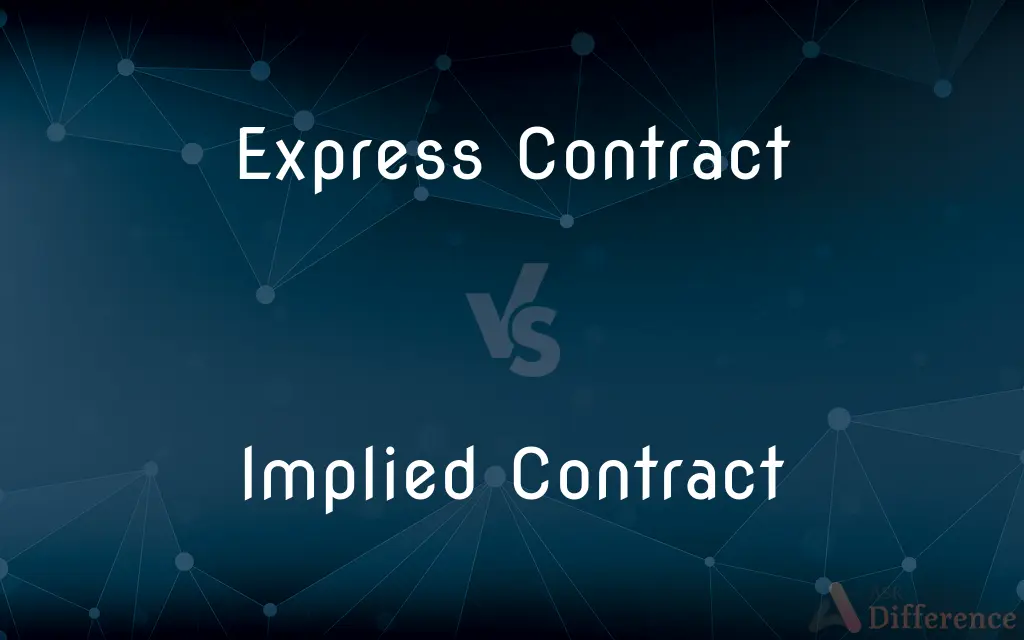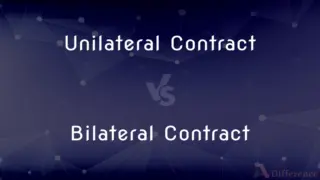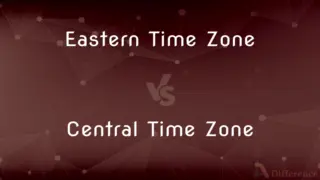Express Contract vs. Implied Contract — What's the Difference?
Edited by Tayyaba Rehman — By Fiza Rafique — Published on November 27, 2023
Express Contract clearly stated terms, either written or spoken. Implied Contract terms are not stated, but inferred from actions or circumstances.

Difference Between Express Contract and Implied Contract
Table of Contents
ADVERTISEMENT
Key Differences
Express Contract is evident through clear, explicit terms and conditions, either communicated through writing or verbal means. Implied Contract, conversely, is forged not through explicit words but rather through the behavior or circumstances surrounding a transaction. This difference primarily circles the clarity and manifestation of agreement.
In the domain of an Express Contract, the parties consciously, and with clear understanding, agree upon the stipulated terms. Contrastingly, in an Implied Contract, the agreement is somewhat veiled, derived from conduct or a situation, which suggests that an agreement is in place, despite not being overtly articulated.
Express Contract elucidates exact, straightforward stipulations agreed upon by involved parties, eliminating ambiguity. On the other hand, Implied Contract may invite a level of uncertainty since the contract's existence and stipulations are deduced from the parties’ conduct or the prevailing circumstances.
Legally, an Express Contract presents a tangible, traceable agreement, which can be directly referred to in a dispute. Conversely, Implied Contract may pose challenges in legal settings due to its lack of clear, written or spoken terms, often relying on indirect evidence of an agreement.
Notably, Express Contract assures all parties are on the same page due to its explicitness. In contrast, Implied Contract might introduce a risk of misinterpretation since the agreement is not transparently conveyed but inferred from actions.
ADVERTISEMENT
Comparison Chart
Formation
Formed through clear, explicit communication
Formed through conduct or circumstantial evidence
Clarity
High due to straightforward terms
May lack clarity as terms are not explicitly stated
Legal Traceability
Easier due to documented/verbal agreements
Can be challenging due to the lack of clear agreement
Risk of Misunderstanding
Lower as terms are clear
Higher due to inferred terms
Use Case
When explicit agreement is necessary
When an agreement is implied by circumstance or behavior
Compare with Definitions
Express Contract
An agreement wherein terms are communicated directly.
An express contract was formed when they agreed on the price verbally.
Implied Contract
Agreement inferred by actions, not explicit words.
His continued use of the software indicated an implied contract of adherence to its terms.
Express Contract
Contract with clear, articulated obligations.
The express contract detailed the delivery dates for the goods.
Implied Contract
A contract indicated by circumstantial evidence.
The mechanic repaired the car, forming an implied contract that the owner would pay.
Express Contract
An agreement with explicitly stated terms.
The landlord and tenant signed an express contract stipulating monthly rent.
Implied Contract
A contract established through non-verbal agreement.
His acceptance of the delivery formed an implied contract for payment.
Express Contract
A legal agreement with unequivocally defined stipulations.
The express contract specified the warranty period for the appliance.
Implied Contract
A contract formed through unspoken understanding.
The diner formed an implied contract by ordering food, implying payment.
Express Contract
Contract where all parties acknowledge the stated terms.
Both the artist and the client agreed to the payment terms in the express contract.
Implied Contract
An agreement deduced from a situation or conduct.
The implied contract was formed when she left her jacket for cleaning.
Common Curiosities
How is an implied contract formed?
Through actions or circumstances implying an agreement.
Is an express contract legally binding?
Yes, due to its clear, agreed-upon terms.
Can implied contracts be unintentionally formed?
Yes, through actions or circumstances implying agreement.
Does an implied contract require spoken terms?
No, it’s derived from actions or situational implications.
Can an express contract be verbal?
Yes, it can be formed through clear verbal communication.
What is an example of an express contract?
A signed lease agreement with specified terms.
What’s crucial for an express contract’s validity?
Clear, understandable, and agreed-upon terms by all parties.
What characterizes an express contract?
Explicitly stated terms, either verbally or in writing.
Can express contracts be modified?
Yes, with the explicit agreement of all parties.
Can you provide an example of an implied contract?
Ordering a meal at a restaurant implies agreement to pay.
How enforceable is an implied contract in court?
It can be enforceable but may require substantial indirect evidence.
Are verbal agreements considered implied contracts?
No, implied contracts are not explicitly stated, even verbally.
Can misunderstandings occur more in implied contracts?
Yes, as terms are not explicitly stated, leading to potential ambiguity.
Are written agreements always express contracts?
Typically yes, as they contain explicitly stated terms.
Can an implied contract become an express contract?
Yes, if parties decide to formalize it with explicit terms.
Share Your Discovery

Previous Comparison
Unilateral Contract vs. Bilateral Contract
Next Comparison
Eastern Time Zone vs. Central Time ZoneAuthor Spotlight
Written by
Fiza RafiqueFiza Rafique is a skilled content writer at AskDifference.com, where she meticulously refines and enhances written pieces. Drawing from her vast editorial expertise, Fiza ensures clarity, accuracy, and precision in every article. Passionate about language, she continually seeks to elevate the quality of content for readers worldwide.
Edited by
Tayyaba RehmanTayyaba Rehman is a distinguished writer, currently serving as a primary contributor to askdifference.com. As a researcher in semantics and etymology, Tayyaba's passion for the complexity of languages and their distinctions has found a perfect home on the platform. Tayyaba delves into the intricacies of language, distinguishing between commonly confused words and phrases, thereby providing clarity for readers worldwide.














































